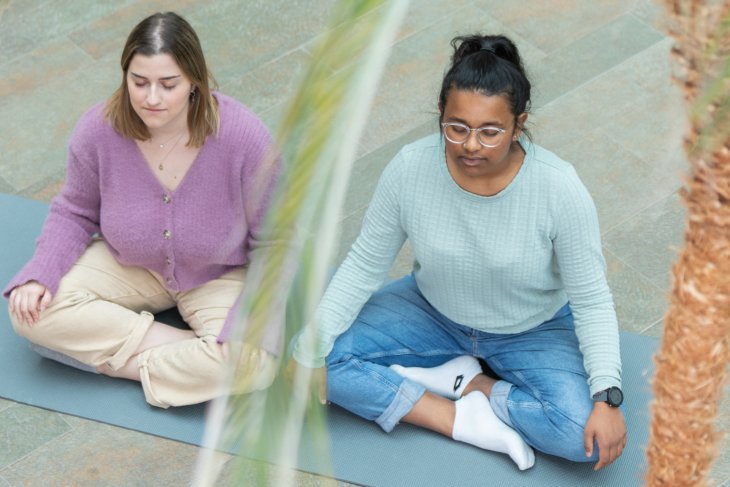1. Mind over matter: your mental health is a priority
Your mind is a powerful tool. When all those deadlines and exams get to you, and you feel as though you’re up against a brick wall, take a deep breath first.
- Meditate: at first, I thought meditation was silly. What are you supposed to do? I kept thinking. But then I realised: you’re not meant to do anything, really. You just have to sit and stay quiet and let your thoughts flow through you. You don’t need any fancy apps or methods: just sit down when you’re not busy, preferably when your work day is over, and reflect. Even five minutes a day can work wonders.
- Journal: I used to keep a dream journal and write down my dreams in a different language to practise that language, however, this is different. In any case, journalling is underrated. If you’re too overwhelmed with your thoughts, writing them down helps clear away mental clutter. Here’s an idea: write down three good things that happened to you that day, or three things you’re grateful for.
- Take a nap: a short nap before a hard task works wonders if you time it right. Naps can range from half an hour to several – you’ll feel refreshed and ready to get right back to it (perhaps after another short break).
2. Move your body! Physical health is also important
Exercise is one helluva stress-buster, and you don’t even need to spend hours at the gym to destress this way.
- Walk during the lunch break: you may feel as though stopping for the entire lunch break is too long, but there’s a lunch break for a reason. You often feel much better and refreshed to keep studying and be productive after you take a break, and what better way than a small walk during lunch? A bit of exercise allows your brain to focus on other things and let your inner thoughts stew.
- Dance to music! Music is a great way to lift your mood; couple that with a short dance session to get your blood flowing and you’ll be re-energised in no time. It’s up to you to decide whether you want to dance in front of people or alone.
3. Food as therapy
To me, food is one of life’s greatest pleasures. It’s not just fuel; it’s therapy.
- Comfort food: treat yourself to something warm and delicious, whatever makes you happy. This can be something you cook or buy. Food can be a reward to motivate you to keep going – I know it’s mine.
- Baking: from the few times I’ve baked, I’ve found it extremely nerve-wracking and also strangely therapeutic. It’s rewarding and makes the kitchen smell like a big bowl of comfort.
- Drink your water! If you’re feeling overly cranky, it might be that you’re not getting enough water in your system.
4. Social recharge
Humans are social creatures, and even just having a chat with a friend can boost your mood immensely.
- Vent to someone: sometimes, all you need is a chat with someone who just listens. This can be done during breaks from your study session, so you can complain about your exams for just a little bit.
- Text or call a loved one: it’s always nice to catch up with people I don’t see every day. For me, it’s my parents, and I always look forward to calling them when I miss them or want to tell them something. Plus, it’s great to have someone on the other end of the phone just supporting you unequivocally.
5. Clean your room!
A chaotic environment breeds a chaotic mind, as they say, so be sure to clean up after yourself.
- Declutter: spend 10 minutes tidying up your desk or room. If you’ve got brain fog from studying too much, physically clearing out that fog can help. I know I feel better returning to studying in a clean, nice-smelling room.
- Set the mood: have nice, ambient music to listen to and chill to for a couple of minutes. Light a candle or turn on a diffuser to waft those smells across your room. Physically creating a peaceful environment helps calm me down.
6. Social media break: everyone needs it!
If you ever get the thought that now might be a good time to take a break from social media for a while, then you probably should heed it.
- Turn your phone off: at least for a couple of hours. Don’t let yourself get consumed by Instagram reels or posts that make you compare yourself to whoever’s on the other side of the screen. Plus, that brain fog I was talking about earlier? This is the main cause for me, at least.
7. Plan and prioritise: put yourself first!
Sometimes, the best way to destress is to get organised.
- Learn to say no: it’s okay to decline extra commitments if you’re feeling stretched. It took me a while to learn that, so start earlier than me: most of the time, things will be fine if you don’t join this one activity for once.
- Set realistic goals: avoid over-cluttering your schedule. Focus on your priorities: get to class, have lunch, study for a bit. Don’t have, say, a meeting every day of the week when you know you’ll get burnt out.
8. Take a trip down nostalgia lane
- Reread your childhood books: sometimes, you want to focus on something easy and memorable. Reading a book you loved as a child is great because you know exactly what’s going to happen, and yet you still retain some of that wonder that your inner child felt.
- Look through an old photo album: when I’m feeling particularly down, I like to go through my gallery and scroll through old photos – they make me feel as though better, similar times are ahead.
Remember that self-care is different for everyone
What works for one person may not work for others or you. You can do anything to de-stress and practise self-care – but that hinges on you, and not anyone else. The best I can do is give you ideas that worked for me and hope that they’ll work for you. With that said, good luck on finding what best destresses you :)




